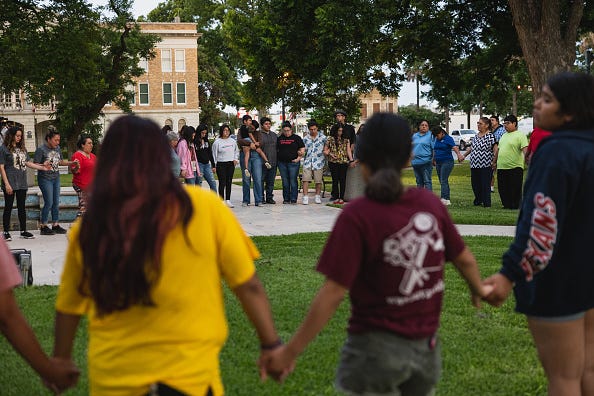
After Tuesday's shooting in Uvalde, Texas, left 19 children and two adults dead, many are struggling to find a way to talk about the tragedy with their kids.
Family therapist Lambers Fisher joined News Talk 830 WCCO's Sheletta Brundidge to discuss the best way to tell children about tragedies, even if it's hard.
"It's not a matter of if you talk about it, it's a matter of how you talk about it," Fisher said.
"The reality is you can't [not tell them] no matter how well you try to, they will be exposed in some way," Fisher said.
When it comes to mass shootings and other tragedies in the world, Fisher says that you can't shield children from them because there are so many avenues where they can find out.
Instead, what is important is finding the appropriate way to talk about it with them so that they hear it from you and not somewhere else. A parent's job includes not just shielding, but also preparing kids for the dangerous world we live in, she said.
"The challenge then transitions to not a matter of how we protect them from the awareness of it, but how do we frame it in a way that they can know that they're still safe in that potentially unsafe world," Fisher said.
Fisher said that the correct way to explain these situations to children is by modeling that they need to be aware of what is happening in the world but not be consumed by it.
He says knowing the dangers and asking questions are a big part of this, and by modeling it, they will pick up on it.
"We need to start by modeling a healthy amount of intake. Find out the right amount of information and then learn to turn it off," Fisher said. "Then help them feel reassured that despite the fact that some bad things happen, they are still safe because you are making intentional efforts to help them feel safe."
Like most things, this is easier said than done, and Fisher knows that it isn't only difficult for children but especially for parents.
Still, Fisher said speaking with your kids and preparing them for different dangers they may encounter is necessary because while you don't want them ever to use it, it could keep them safe.
"You shouldn't have to do all this, but unfortunately, it is necessary under the circumstances," Fisher said. "Once you realize that it is necessary to help them stay safe, you can frame it that way. It's an empowerment challenge. You shouldn't have to do this, but you can do things… to help you feel even more safe."

